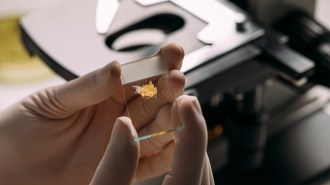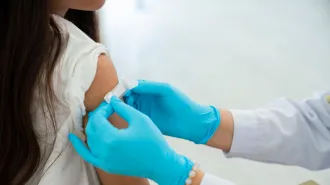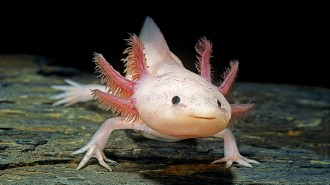Protein flags colon, prostate cancers
A protein first identified as a possible culprit in Huntington’s disease may be an indicator of cancers of the prostate gland and colon, researchers report in the Aug. 1 Journal of Clinical Investigation.
The chemical is called huntingtin interacting protein 1, or HIP1, and it appears only rarely in healthy tissues and typically in small amounts. In an analysis of 53 solid-tumor cancer cell lines, Theodora S. Ross, an oncologist and biochemist at the University of Michigan in Ann Arbor, and her colleagues found evidence that HIP1 is produced in 50 of them, including cancers of the prostate, colon, breast, ovary, kidney, lung, and skin. Data from seven leukemia cell lines bolstered past findings that HIP1 is also prevalent in blood cancer.
More extensive tests of prostate-tumor cells from 114 patients showed overproduction of HIP1 in 51 percent of tumors that had remained localized and in 70 percent of tumors that had spread beyond the prostate. In contrast, HIP1 was detectable in only 5 percent of healthy prostate glands. Although it would require a biopsy of prostate tissue, an HIP1 test for the cancer might be more definitive than the currently used blood test measuring the protein called prostate specific antigen, Ross says.
The same research group found that colon-tumor cells from 12 of 25 patients showed signs of high HIP1 production, whereas normal colon tissue contained no HIP1.
Although HIP1 binds to huntingtin, a protein that appears in a mutant form in Huntington’s disease patients, it isn’t clear what role, if any, HIP1 plays in that neurodegenerative disease, Ross says.
HIP1 may be indispensable for many cancer cells’ survival, however. Silencing the gene that encodes HIP1 induces apoptosis, or programmed cell death, in some tissues. Because the protein is so prevalent in some cancer cells, Ross says, this gene-silencing approach could prove promising as a cancer therapy.
****************
If you have a comment on this article that you would like considered for publication in Science News, please send it to editors@sciencenews.org.







